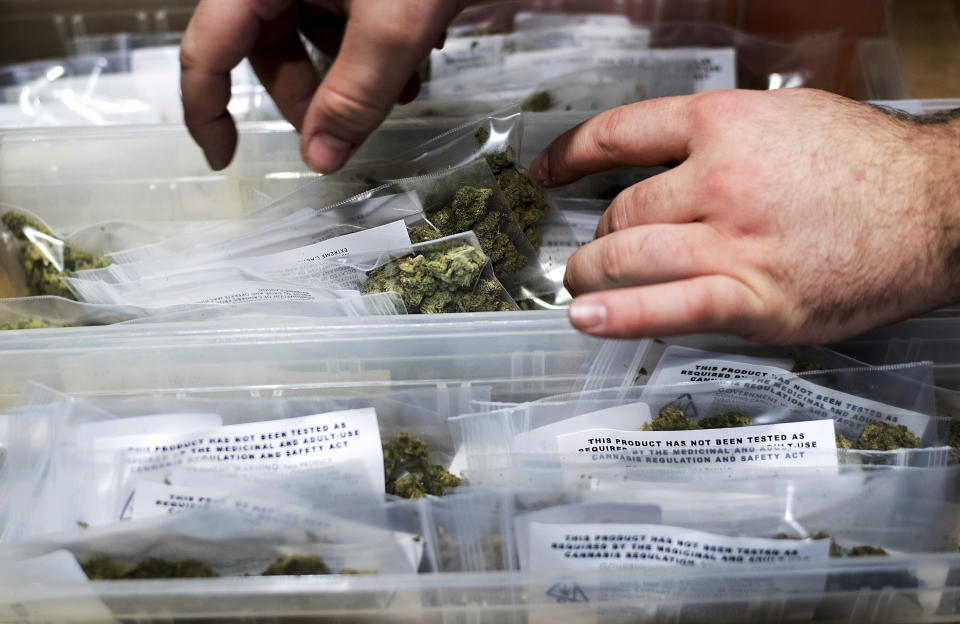Cannabis companies post mixed bag of quarterly results
A mixed set of results from some the cannabis sector’s biggest names is providing further clues on the direction of the nascent industry.
Cannabis stocks have been mostly lower recently amid tougher Canadian licensing requirements, mixed reception for newly announced cannabis deals, and general weakness in the broader market. Shares of the MJ Alternative Harvest ETF were down 10.25% from the beginning of March through Tuesday’s close.
Typically, cannabis companies have traded in lockstep with one another as investors betted on the prospects of the industry as a whole amid evolving regulation, consumer trends and public perception. However, the latest quarterly results from these companies revealed significant divergences in their fundamental performances over the last several months after adult use legalization in Canada settled in.
Tilray (TLRY) Tuesday afternoon reported better-than-expected fiscal first-quarter sales and and a narrower-than-expected loss, sending shares as much as 6.79% higher in extended trading before diving into the red Wednesday. Sales increased by nearly threefold to $23 million, ahead of expectations for $21.4 million, and adjusted EBITDA losses were $14.6 million, a smaller loss than the $16.7 million expected.
Tilray saw a surge in sales volumes, with total kilogram equivalents rising to 3,012 kilograms in the quarter, a two-fold increase from the year prior.
The company cited the legalization of Canadian adult-use cannabis in 2018, the addition of hemp food sales from its acquisition of Manitoba Harvest earlier this year and strong growth in international medical markets for its strong top-line growth. Medical cannabis sales jumped more than 300% over last year for the three months ending March 31.
Adult-use sales totaled $7.89 million, comprising 34% of all revenue for the quarter.
However, Tilray’s average net selling prices – a closely watched metric of profitability for cannabis companies – decreased to $5.60, or 34 cents less than in the year-ago quarter. And while gross margins increased sequentially by 3 percentage points to 23%, they fell 47 percentage points from the first quarter of 2018. Tilray said cost pressures from ramping up its cultivation facilities in Canada and Portugal, where the company has a license to produce products for its EU market, weighed on margins.

Meanwhile, CannTrust turned a surprise profit in the first quarter, the company reported Tuesday morning, and revenue more than doubled. CannTrust reported net income of C$12.8 million ($9.5 million), or 12 cents per share, on total revenue of C$16.9 million ($12.5 million). The company said its harvested production nearly doubled to 9,400 kilograms in the first quarter.
The stock rose 0.49% as of 9:46 a.m. ET on Wednesday, after earlier being higher by as much as 3.3% in after-hours trading.
But quarterly results for Edmonton, Canada-based Aurora Cannabis were less upbeat, even as the company posted a quarter-over-quarter boost in both medical and consumer cannabis net revenue amid widespread Canadian legalization. The company reported revenue of C$65.1 million, falling short of expectations for C$71.7 million. Its net loss widened to C$158.4 million – far wider than the C$53.2 million loss expected.
Shares fell 1.33% to $8.27 each Wednesday morning, after being lower by as much as 5.89% in early trading.
As with Tilray, Aurora saw a year-over-year decline in average net selling price per gram, which fell 20% this period to C$6.40. But costs to produce also declined, as the company’s new mass production Sky and Bradford facilities hit full operational capacity for a run rate above 150,000 kilograms per year.
Aurora said it anticipates its supply to Europe and international markets will increase as more of Aurora’s production facilities receive certification. The company began exporting its higher margin, full spectrum cannabis extracts in Germany in the last quarter, which Aurora expects will help boost future growth.
Emily McCormick is a reporter for Yahoo Finance. Follow her on Twitter: @emily_mcck
Read more from Emily:
Tech companies like Lyft want your money – not ‘your opinion’
Levi Strauss shares jump more than 30% above IPO price at open
Facebook sued by Trump administration for alleged ‘discriminatory’ ad practices
Boeing 737 Max groundings ‘pressure’ U.S. economic data: Wells Fargo
Follow Yahoo Finance on Twitter, Facebook, Instagram, Flipboard, LinkedIn, and reddit.